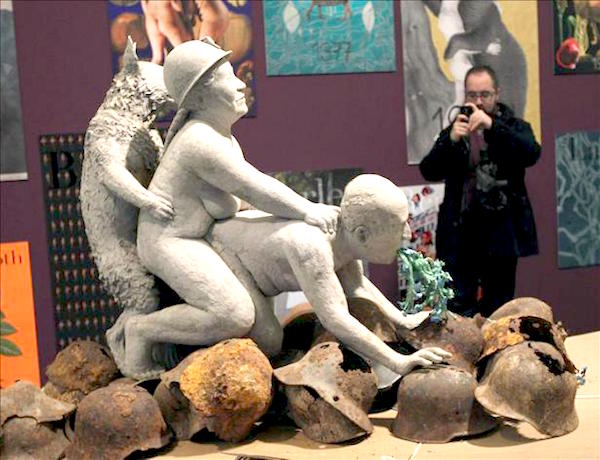Art & Exhibitions
MACBA Director Bartomeu Marí Sacks Curators and Resigns Following Sodomy Sculpture Scandal
Curators Roma and Preciado had been in the job for less than three months.

Photo via: Yahoo
Curators Roma and Preciado had been in the job for less than three months.

Lorena Muñoz-Alonso

The MACBA crisis—triggered by Bartomeu Marí’s decision to cancel the exhibition “La bestia y el soberano” (“The Beast and the Sovereign”) last week—has taken a dramatic turn (see MACBA Barcelona Show Canceled Over Pornographic Artwork Ridiculing Spanish King Juan Carlos).
Yesterday, MACBA’s board of trustees accepted Marí’s resignation. It also fired the two MACBA curators involved in the exhibition, Valentín Roma and Paul B. Preciado, at the request of the outgoing director, who cited “an irrecoverable loss of trust” in them, El País reports.
Many have seen Marí’s last move as an act of revenge.
It all began last Monday, when Marí claims he first saw the piece Not Dressed for Conquering by the Austrian artist Ines Doujak. The sculpture features former Spanish king Juan Carlos and Bolivian Labor leader Domitila Chúngara involved in a sexual act with a dog on a bed of SS helmets. (The artist and curators dispute Marí’s claim, and produced last week a loan form for the piece, signed by Marí on February 25, as evidence, reports El Confidencial).
Marí asked the curators and artist to remove the piece from the show, and, given their refusal, decided to cancel the whole exhibition, which was slated to open the following day.
Outrage over Cancellation
“La bestia y el soberano” is a co-production of MACBA and Stuttgart’s Württemberg Kunstverein, whose co-directors, Hans D. Christ and Iris Dressler, have co-curated the exhibition with Roma and Preciado. Artists featured in the exhibition include Juan Downey, León Ferrari, Genesis Breyer P-Orridge, Mary Reid Kelley, and Wu Tsang.
The decision to cancel the show sparked wide-spread outrage. MACBA’s staff immediately requested a meeting with the museum’s management to “understand the implications of the disagreement between the curators and the director.” A group gathered at the museum’s doors on Wednesday evening to protest the cancellation of the show.
Some voices even suggested that given that the president of honor of MACBA’s board of trustees is former Queen Sofía, wife of Juan Carlos, the cancellation might have been the result of external pressures. Marí consistently denied this, telling the Spanish weekly El Cultural: “The board of trustees had nothing to do with this. I took the decision myself.”
But on Friday afternoon, Marí backtracked and announced that the exhibition would finally open the following day—controversial sculpture included.
He said in a open letter: “In response to the unanimity of voices from professional associations, entities, and individuals demanding the opening of the exhibition ‘La bestia y el soberano,’ I have decided to make it accessible to the public from tomorrow, Saturday March 21.”
And the exhibition opened indeed, with a reported 48 percent increase in visitor numbers, according to El País.
MACBA is Going Through a Profound Crisis
Roma and Preciado’s surprise dismissal highlights yet again the huge turnover of curators at MACBA since Martí took the helm of the museum in 2008, after four years as chief curator. Friedrich Meschede, Chus Martínez, and Carlos Guerra have all come and gone since. Roma and Preciado were appointed as recently as January 2015: Roma as chief curator, and Preciado as chief of public programs.
Marí was appointed to substitute Manuel Borja-Villel, who left Barcelona to direct Museo Reina Sofia in Madrid to great critical acclaim—and a few controversies of his own (see Which Five European Museum Directors Are Doing the Best Job? and Angry Christians Demand Resignation of Museo Reina Sofía Director).
According to a document released by the board of trustees, Marí will stay in post for three or four months, until a suitable replacement is found. The curators’s dismissal is effective immediately, but the museum will implement the rest of their 2015 program.
“MACBA is going through a profound crisis,” Jaume Ciurana, president of the MACBA Consortium, admitted yesterday following the board meeting. “We want to start a new period in the life of the museum that, as a public entity, assumes the responsibility of transmitting art, of offering multiple visions, and generating debate,” he declared.
On that last point at least, MACBA has already delivered beyond expectations.